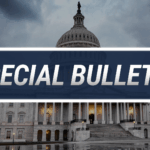When our son Zach was five, he asked about a case I was litigating against the government in Arizona.
“Are you on offense or defense?” he inquired. I explained that we were the plaintiffs, which meant we were “on offense.” Zach looked pensive before he declared “I think that when you fight the government, you’re always on defense.”
He was young, but also correct, as illustrated by last Friday’s appeals court ruling in the dispute between the American Hospital Association (AHA) and the Centers for Medicare & Medicaid Services (CMS). (For a copy of the decision click here.)
In 2014, the AHA sought a court order compelling CMS to reduce the ALJ appeal backlog. The legal term for this is “mandamus.”
Initially, the district court refused to grant it, but last year, the court of appeals agreed that mandamus was appropriate and instructed the district court to develop a plan to eliminate the backlog. (That decision can be found here.)
The district court did just that, (see the District Court’s order) establishing obligations for CMS to reduce the backlog by 30 percent by the end of 2017, then 60 percent by the end of 2018, and 90 percent by Dec. 31, 2019 before completely eliminating the backlog by the end of 2020.
CMS appealed again, arguing that it will be impossible to meet the court’s deadlines. The appeals court gave CMS a glimmer of hope, concluding that the district court must determine whether it would be possible for CMS to comply with the court’s order.
The appeals court then ruled that a court can’t order the impossible, so if it is not possible for CMS to comply with the order, then the mandate ruling must be modified. The appeals court did note, however, that the burden is on CMS to prove that it truly would be impossible, not merely difficult, to comply.
The court also acknowledged that CMS had been highly uncooperative with the court’s effort to develop a plan to resolve the backlog. The last paragraph of the opinion confirms that while ruling for CMS, the judges are not happy with the agency’s approach:
“In sum, it was an abuse of discretion to tailor the mandamus relief without tackling the Secretary’s claims that lawful compliance would be impossible. We emphasize, however, that the District Court was assigned an exceptionally difficult project. The Secretary presented a flurry of arguments as to what cannot be mandated, but a paucity of proposals regarding what can be. With little assistance from the party best positioned to furnish crucial information, the Court needed to craft workable relief while negotiating both the on-the-ground realities and the guidance offered in our past decision. An unenviable task. Difficult as it was, however, courts must ensure that it is indeed possible to perform the act being commanded. Ought, after all, implies can.”
So where does this leave the litigation? The three-judge panel voted two to one to require the district court to make factual findings about whether it was asking CMS to do the impossible. An obvious question is whether CMS can claim “it would be too expensive to hire the judges necessary to complete the task.” Surprisingly, that may be the case One line of the ruling notes that a task is impossible “where the impossibility is the result of insufficient congressional appropriations.” As a result, CMS can be expected to argue that absent congressional action, it can’t meet the statutory deadlines.
One of the two judges in the majority was Merrick Garland, who you may remember was President Obama’s nominee for the Supreme Court. The dissenting judge felt that CMS has had ample time to address the problem and believes it was entirely reasonable for a court to place restrictive demands on it. He observed that there will likely be yet another appeal, which in his opinion will “waste time, punishing blameless Medicare providers who await billions of dollars of delayed payments essential to their operations.”
The case now heads back to the district court for further analysis. The odds are that the dissent is correct, and that with another district court ruling and then possible appeals, it may be many months (and quite possibly more than a year) before the case is resolved.
Finally, there is an interesting and potentially troubling fact contained in the dissent. The percentage of appeals that are successful is falling steadily. Quoting a report from the Office of Medicare Hearings and Appeals, the dissenting judge noted that the percentage of appeals resulting in fully favorable dispositions steadily fell from 53 percent in 2012 down to 26 percent in 2016. There could be any number of reasons for the number of fully favorable decisions to fall.
Perhaps more of the appeals are frivolous. However, anecdotal experience suggests that the appeals process is becoming less friendly to healthcare organizations. My colleagues and I have noticed that facts that previously would have resulted in a favorable decision for a healthcare organization are now resulting in a ruling for CMS. The statistics confirm that for whatever reason, fully favorable appeals are now half as common as they were just five years ago.
That trend should concern physicians and hospitals alike.






















